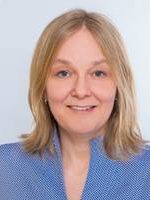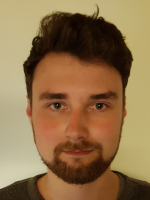Prof. Dr. Frauke Liers
Prof. Dr. Frauke Liers
Go to
Research Interests
I am interested in optimization under uncertainty, in particular integrating knowledge from data analysis. Optimization problems with mixed-integer and nonlinear aspects are of special interest.
Short CV
Publications
Download publications (pdf file)
Projects
Funding source: Bundesministerium für Wirtschaft und Energie (BMWE)
Project leader: ,
Funding source: Deutsche Forschungsgemeinschaft (DFG)
Project leader: ,
Funding source: DFG / Sonderforschungsbereich (SFB)
Project leader:
The objective is the targeted design of particulate products by rigorous optimisation based on predictive structure-property and process-structure functions. Particulate products consist in the simplest case of dis-persed single particles and in more complex cases of hierarchically organised assemblies of particles in the form of supraparticles, thin films and stationary phases for chromatographic separation. We target break-throughs in the product engineering of nanoparticles (NPs) with optimised…
Funding source: DFG / Sonderforschungsbereich (SFB)
Project leader:
The objective is the development, algorithmic design, implementation and validation of robust mathematical optimisation methods for protecting the design of particulate products against uncertainties. Global solution methods will be investigated for optimal robust chromatography as well as synthesis processes, develop-ing methods based on reformulation and decomposition. The obtained results will be validated with the projects. Information on which uncertainties are most relevant and should be reduced,…
Funding source: Bundesministerium für Wirtschaft und Energie (BMWE)
Project leader:
Efficient runway utilization is a major issue in airport operation, as capacities are (nearly) reached in many aiports. But planing is highly affected by uncertainties arising from weather changes or disruptions in the operative business. Furthermore, the planing of flight trajectories in the terminal region is by now often neglected in runway scheduling, as time efficient solution methods are mathematically challenging. The overall goal of this project is to combine trajectory and runway schedule…
Funding source: DFG / Sonderforschungsbereich / Transregio (SFB / TRR)
Project leader: ,
The goal of this research project is to study uncertain optimization problems using robust optimization methods. Focusing on transport networks, we aim at the development of tractable robust counterparts for uncertain optimization problems and an analysis of the problem structure. For the arising adjustable robust optimization tasks, good relaxations as well as effective branch-and-bound implementations shall be developed.
Funding source: Bundesministerium für Wirtschaft und Energie (BMWE)
Project leader:
Funding source: Europäische Union (EU)
Project leader:
Building upon the achievements of the Marie-Curie ITN Mixed-Integer Non-Linear Optimization (MINO) (2012 - 2016), the goal of the Mixed-Integer Non-Linear Optimisation Applications (MINOA) proposal is to train the next generation of highly qualified researchers and managers in applied mathematics, operations research and computer science that are able to face the modern imperative challenges of European and international relevance in areas such as energy, logistics, engineering, natural sciences,…
Funding source: Bundesministerium für Forschung, Technologie und Raumfahrt (BMFTR)
Project leader: ,
Funding source: Bayerisches Staatsministerium für Bildung und Kultus, Wissenschaft und Kunst (ab 10/2013)
Project leader: , , , , , ,
In the project “Energy Markt Design” within EnCN2 a team of researchers from economics, mathematics, and law analyses the economic and regulatory environment for the transformation of the energy system. The main objectives are to enhance the methods in energy market modeling and to contribute with well-grounded analyses to the policy discourse in Germany and Europe. For the electricity market, the focus is on the steering effect of market designs on regulated transmission expansion and private inv…
Funding source: BMBF / Verbundprojekt
Project leader:
Ambulatory care is an essential part of our health care system. This system faces major challenges, especially with respect to demographic changes, centralization of health care facilities as well as a combination of dwindling ressources and increasing costs. This change is already noticeable in rural environments. Small villages and dispersed settlements are affected by huge population decreases. Hence, the current medical infrastructure is no longer sustainable.
Funding source: DFG / Sonderforschungsbereich / Integriertes Graduiertenkolleg (SFB / GRK)
Project leader: ,
Funding source: DFG / Sonderforschungsbereich / Transregio (SFB / TRR)
Project leader: ,
Funding source: EU - 7. RP / People / Initial Training Networks (ITN)
Project leader:
Complex decision making in enterprises should involve mathematical optimization methods, because a best choice has to be made out of a huge number of feasible options. A mathematical description of such decision processes typically involves both continuous and discrete decisions. If the latter are present, the customary modelling approach is to use integer variables, which are also used to represent all possible nonlinearities, so that the remaining part of the model is linear. This leads to Mixed-Integer…
Editorial Activities
- Associate Editor, Mathematical Methods of Operations Research
- Associate Editor, Optimization and Engineering
- Associate Editor, Discrete Optimization
- F. Anjos, F.M. Hante, F. Liers (Eds.) Special Issue on Energy Networks, Mathematical Methods of Operations Research, (2022)
Selected Courses
- optimization under uncertainty (robust, stochastic, distributionally
robust) - mathematics of learning (supervised, unsupervised learning)
- selected topics in mathematics of learning
- theoretical foundations of optimization
- optimization in industry and economy
- project seminars in the broad field of optimization
- mathematics for engineers
- mathematical optimization for communication and signal processing



